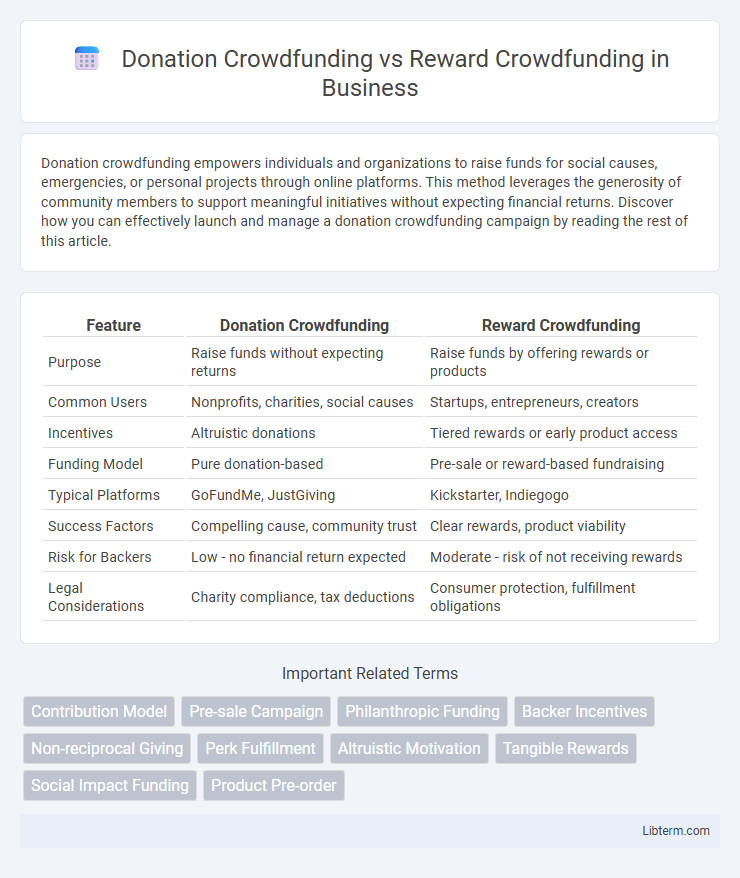Donation crowdfunding empowers individuals and organizations to raise funds for social causes, emergencies, or personal projects through online platforms. This method leverages the generosity of community members to support meaningful initiatives without expecting financial returns. Discover how you can effectively launch and manage a donation crowdfunding campaign by reading the rest of this article.
Table of Comparison
| Feature | Donation Crowdfunding | Reward Crowdfunding |
|---|---|---|
| Purpose | Raise funds without expecting returns | Raise funds by offering rewards or products |
| Common Users | Nonprofits, charities, social causes | Startups, entrepreneurs, creators |
| Incentives | Altruistic donations | Tiered rewards or early product access |
| Funding Model | Pure donation-based | Pre-sale or reward-based fundraising |
| Typical Platforms | GoFundMe, JustGiving | Kickstarter, Indiegogo |
| Success Factors | Compelling cause, community trust | Clear rewards, product viability |
| Risk for Backers | Low - no financial return expected | Moderate - risk of not receiving rewards |
| Legal Considerations | Charity compliance, tax deductions | Consumer protection, fulfillment obligations |
Introduction to Crowdfunding Models
Donation crowdfunding involves raising funds for charitable causes or personal needs without offering financial returns, relying on the generosity and goodwill of donors. Reward crowdfunding incentivizes backers by providing non-monetary rewards or products in exchange for their support, commonly used by startups and creative projects. Both models leverage online platforms to connect creators with supporters, optimizing funding through distinct motivational approaches.
What is Donation Crowdfunding?
Donation crowdfunding involves raising funds for charitable causes, nonprofit organizations, or personal needs without offering any financial return or tangible reward to the donors. It relies on the generosity of individuals who contribute out of goodwill, often motivated by social impact, community support, or empathy for the cause. This method contrasts with reward crowdfunding, where backers receive a product or service in exchange for their financial support.
What is Reward Crowdfunding?
Reward crowdfunding is a fundraising method where backers contribute money to a project in exchange for non-monetary rewards, such as products, services, or exclusive experiences. This model is popular among startups, creative projects, and product launches, enabling creators to validate ideas and generate pre-sales. Unlike donation crowdfunding, reward crowdfunding provides tangible incentives, motivating supporters with value beyond altruism.
Key Differences Between Donation and Reward Crowdfunding
Donation crowdfunding involves raising funds without offering any material return, relying primarily on altruism to support causes, charities, or individuals in need. Reward crowdfunding incentivizes backers with tangible or experiential rewards related to the project, such as early product access, merchandise, or exclusive updates. The key differences lie in the motivation of contributors, the presence of incentives, and the typical use cases, with donation crowdfunding focusing on philanthropy and reward crowdfunding emphasizing product development and creative projects.
Motivations of Backers in Donation vs Reward Campaigns
Backers of donation crowdfunding campaigns are primarily motivated by altruism, social impact, and community support, seeking to contribute without expecting financial returns. In contrast, reward crowdfunding attracts backers driven by the desire to receive exclusive products, early access, or unique experiences, emphasizing tangible incentives and personal benefits. Understanding these distinct motivations allows campaign creators to tailor their messaging and engagement strategies to better connect with their target audience.
Benefits of Donation Crowdfunding
Donation crowdfunding empowers nonprofits and individuals to raise funds without offering financial returns, fostering community support and charitable giving. This method enhances donor trust by emphasizing altruistic motives and social impact, often resulting in increased engagement and repeat contributions. Compared to reward crowdfunding, donation crowdfunding eliminates production costs and delivery risks, maximizing the resources available for the cause.
Benefits of Reward Crowdfunding
Reward crowdfunding offers backers tangible incentives, enhancing engagement and motivation to support projects. Creators gain market validation and early customer feedback, reducing financial risks while building brand loyalty. This model fosters community development by aligning supporters' interests with project success through exclusive rewards and experiences.
Challenges and Risks in Each Model
Donation crowdfunding faces challenges such as donor fatigue, limited repeat contributions, and difficulties in demonstrating impact, which can hinder sustained funding. Reward crowdfunding risks include unmet product expectations, delays in delivery, and legal complications related to intellectual property and consumer protection. Both models require transparent communication to manage backer trust and mitigate reputational damage.
Choosing the Right Crowdfunding Approach
Donation crowdfunding centers on raising funds without expecting financial returns, ideal for charitable projects and social causes. Reward crowdfunding offers contributors tangible incentives or exclusive products, making it suitable for startups and creative ventures seeking engagement and customer validation. Selecting the right crowdfunding approach depends on project goals, target audience motivations, and the desired relationship between funders and creators.
Future Trends in Crowdfunding Models
Donation crowdfunding is expected to grow with a focus on social impact and charitable causes driven by increased global awareness, while reward crowdfunding will continue evolving through enhanced digital integration such as blockchain and NFT rewards. Future trends indicate a hybridization of models, leveraging both altruistic donations and value-based incentives to attract diverse backers. Integration of AI-driven personalization and decentralized platforms is anticipated to optimize campaign success and expand accessibility for creators and charitable projects alike.
Donation Crowdfunding Infographic

 libterm.com
libterm.com